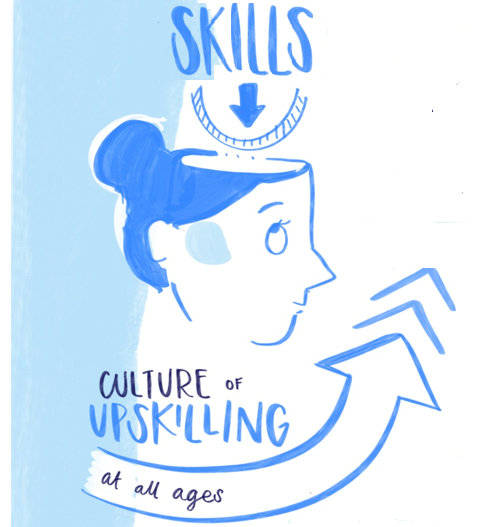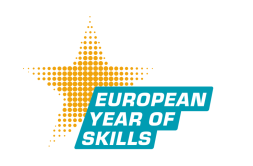Skills and the social economy

The way we work, learn, take part in society and lead our everyday lives is changing with technological developments, environmental and demographic challenges. The right skills and knowledge help individuals adjust to these changes and ensure their well-being, while contributing to long-term sustainable growth and competitiveness.
Today, there is a great need for up- and reskilling also in the proximity and social economy ecosystem. People need to be equipped with a variety of competences and expertise, ranging from basic skills, such as literacy, numeracy and digital literacy, to vocational or technical skills as well as entrepreneurial skills, organizational skills, managerial skills and transversal skills, such as foreign languages or personal development and learning to learn.
European Year of Skills
The social economy is a key driver of up- and reskilling in a large variety of economic sectors. It is thus well placed to help deliver the objectives of the European Year of Skills, which officially started on 9 May 2023, and the EU headline target for skills by 2030, namely at least 60% of all adults should take part in training every year.

European Year of Skills – 9 May 2023 to 8 May 2024
The European Year of Skills aims to address skills gaps in the European Union and boost the European Skills Agenda, which will help reskill people with the skills in demand, such as digital and green technology skills. This will require helping people get the right skills for quality jobs and helping companies, in particular small and medium enterprises, to address skills shortages, by highlighting national efforts and EU initiatives and EU funding possibilities. The Year will support skills-related activities and events across Europe.
Throughout the Year, there will be many opportunities to contribute and highlight the social economy’s initiatives on skills development. How can you get involved?
- Are you organising a skills-related event or activity? Add your event or activity to the European Year of Skills map by filling in the form. Please use the EYS logo and communication materials.
- Do you have a skills story to share? Share your story and/or promote your skills project with us. More details here.
- Want to know more about national efforts on skills? Contact your national coordinator for the European Year of Skills. Full list here.
Opportunities at EU level
Learn more about what the EU is doing for you in the area of skills here. Some highlights for the social economy:
European Skills Agenda
The European Skills Agenda is the framework for EU skills policy cooperation and will continue to help individuals and businesses develop skills and to apply them. Published in July 2020, it set ambitious, quantitative objectives for upskilling (improving existing skills) and reskilling (training in new skills) to be achieved by 2025.
Pact for Skills
The EU Pact for Skills is a flagship initiative of the European Skills Agenda, which aims to mobilise stakeholders to take concrete actions for up- and reskilling. In this framework, the large-scale partnership for proximity and social economy was launched on 6 May 2022. The partnership brings together social economy entities and other relevant stakeholders such as impact investors, microfinance providers, ethical and cooperative banks, vocational education and training providers, universities, regions and municipalities to boost upskilling and reskilling in the ecosystem. This partnership notably aims at enabling the up- and reskilling of 5% of its workforce each year, in view of delivering the green and digital twin transition.
Want to join the Pact of Skills and the large-scale partnership for proximity and social economy ? Apply here
Blueprints for sectoral cooperation on skills
B-WISE: The Blueprint for Sectoral Cooperation on Skills in Work Integration Social Enterprises is an Erasmus+ project that aims to develop a European strategy (i.e. blueprint) to address the skills needs, in particular regarding digital skills, in the Work Integration Social Enterprises (WISEs) sector. The B-WISE project targets the skills needs of workers with support needs, their supporters (such as their job coaches, trainers) and their managers. The project also promotes the attractiveness of the WISE sector as a career choice and raises awareness on the importance of the use of digital technologies to support workers -who are more at risk to be excluded from the labour market- in work placement.
For regular content updates on the Blueprint, follow the LinkedIn page.
baSE: The Blueprint for advanced skills and training in the social economy project is a blueprint alliance for social economy and proximity skills, supported by the Erasmus+ programme. baSE aims at reinforcing the capacities of social economy and its human capital in key areas involving 25 partners from 10 European countries forming an alliance focused on skills mismatches for upskilling and reskilling of social economy practitioners contributing to developing a new strategic approach (i.e. blueprint) to sectoral cooperation on the offer of skills for new or updated occupational profiles for social economy actors, notably in the care and energy sector.
For regular content updates on the Blueprint, follow the LinkedIn page.
ESIC: The European Social Innovation Campus (ESIC) Blueprint Alliance was launched in September 2023. Focusing on social innovation in the social economy, the Alliance brings together higher education and vocational education and training, social economy organisations and enterprises from several European countries and European-level actors. Drawing on evidence regarding the skills needs of occupational profiles, the Alliance boosts the provision of new skills. It addresses skills mismatches by creating a new general Core Curriculum for the social economy and curricula for different EQF levels. The Alliance designs and delivers transnational education and training content and co-produces teaching and training methodologies for quick uptake of the content at regional and local levels and emerging occupational profiles. In addition, the project will establish a strong communication and dissemination network, promoting the social economy sector as a career choice and supporting the development of a sense of initiative and entrepreneurial mindset in the EU. The Alliance will establish and maintain the European Social Innovation Campus platform that distributes project results. The dynamic Skills Monitor integrated into the platform will host skills intelligence data in an open data format and be accessible to all stakeholders and researchers.
Transition pathways
On 14 November 2022, the European Commission released its transition pathway for the proximity and social economy ecosystem. Building on 14 actions areas, the pathway pinpoints avenues of actions for a strengthened and more resilient social economy ecosystem for the green and digital twin transition. Action areas 7 and 14 shed light on the needs for upskilling and reskilling in the ecosystem and stress the key role its entities play in providing knowledge, competences and capacity to ensure a fair twin transition.
A call for pledges is currently open, aiming at collecting concrete actions social economy entities and other relevant stakeholders are undertaking to co-implement the actions laid out in the pathway.
Submit your pledges on green and digital skills before the next deadline (1st December 2023).
The European Digital Skills and Jobs Platform
The European Digital Skills and Jobs Platform, launched under the Connecting Europe Facility, offers information and resources on digital skills, such as a self-assessment tool.
EU Digital Skills and Jobs Coalition
The Digital Skills and Jobs Coalition (DSJC) tackles the digital skills gap by bringing together all relevant partners to raise awareness and encourage training to boost digital skills. All organisations striving to boost digital skills in Europe can join the Coalition by submitting a pledge via the Digital Skills and Jobs Platform.
Become a Pledger now! Read this quick guide on how to submit pledge
Erasmus for Young Entrepreneurs
Erasmus for Young Entrepreneurs is a cross-border programme that facilitates the exchange of entrepreneurial and management experience. This exchange is achieved through a stay, during which a newly established or potential entrepreneur collaborates with a well-experienced entrepreneur who runs a small or medium-sized enterprise (SME) in another country.
Youth Entrepreneurship Policy Academy
The Youth Entrepreneurship Policy Academy is a policy-learning network of 150 participants, including policymakers, youth entrepreneurship networks and organisations, social entrepreneurship networks, programme managers and researchers.
Online capacity building events are regularly organised (on access to finance, green transition, etc.) and a specific session on social entrepreneurship will take place in October 2023. Do not hesitate to register.
Council recommendations on Micro-credentials and Individual Learning Accounts
The Council recommendations on Micro-credentials and Individual Learning Accounts help people to update or complete their skill sets in a more flexible and targeted way.
The Council recommendation on Micro-credentials recommends Member States to adopt a European approach to micro-credentials and in particular to apply a common EU definition, EU standards and key principles for the design and issuance of micro-credentials.
The Council recommendation on Individual Learning Accounts recommends that Member States consider establishing individual learning accounts as a means for enabling and empowering individuals to participate in labour-market relevant training and facilitate their access to or retention in employment.

